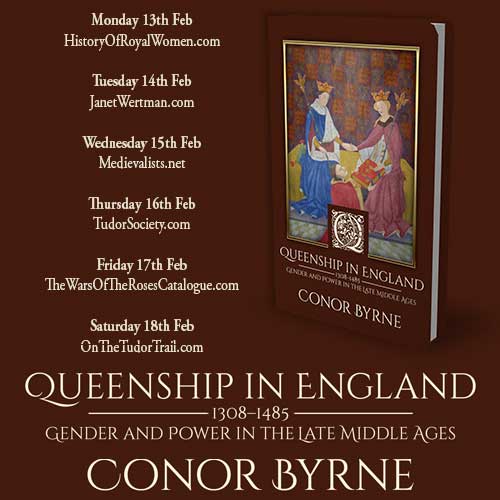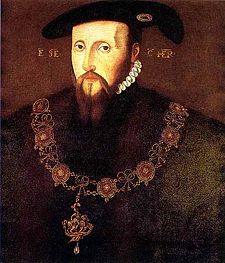 I've just received an email from Giles Tremlett about his latest book Isabella of Castile: Europe's First Great Queen, which I know many of you will be interested in. His book on Catherine of Aragon was excellent.
I've just received an email from Giles Tremlett about his latest book Isabella of Castile: Europe's First Great Queen, which I know many of you will be interested in. His book on Catherine of Aragon was excellent.
Here's what Giles says about his book:
"This week my latest book, a 625-page biography of Isabella of Castile, is published by Bloomsbury in the United Kingdom. It will be out in the United States on March 7 and will be available in Spanish and Chinese before year's end. Early reviews from the US specialist book trade magazines are promising: "Magisterial... sublime presentation of facts and interpretation," (Booklist); "highly readable, engrossing biography" (Library Journal) etc... Reviews will begin to appear in major UK papers next week.
Isabella was, in terms of global impact, the first of Europe's great queens regnant. In my view she was almost certainly the greatest, with Russia's Catherine the Great as the only worthy rival. Victoria, Elizabeth I and Maria Theresa of Austria are, I'm afraid, mere runners up (and I'm quite happy to have that argument with anyone who wants it). Apologies, my Swedish friends, Queen Christina is fascinating, but not that way.Here is a short list of events directly attributable to Isabella. Some are fabulous, others are horrific, but all are momentous. Together, they are:
- Usurps the crown of Castile aged 23, defeats her enemies in battle and tames the Grandees to install a strong monarch for the first time in a century.
- "Unites" Spain (or, rather, starts the process), by rebelliously choosing Ferdinand of Aragon for her husband.
- Creates the current boundaries of Spain (minus Navarre and tiny bits of North Africa) by conquering the Moslem kingdom of Granada and the Canary Islands.
- Reverses net Moslem territorial gains in Europe for first time in decades, with the traumatic loss of Constantinople, Greece and the Balkans still fresh in anxious, fearful Christian minds.
- Founds the infamous "Spanish Inquisition" - with waterboarding and burning at the stake - as a royal-led project.
- Sends Columbus off, allowing embattled Christendom to straddle the Ocean and ensuring the future dominance of the Atlantic seaboard nations and western "civilization".
- Also begins the extraordinary "Columbine exchange" of plants, animals and diseases between continents while also starting the eradication, by disease and hunger, of most of the Caribbean islands' population. Permits African slaves to replace them, starting centuries of trans-Atlantic slave trading.
- Begins the creation of the first global empire on which the sun never sets, which will soon make Spain Europe's dominant power.
- Expels the world's largest community of Jews.
- Forcibly converts Spain's Moslems, ending centuries of religious coexistence.
- Makes Spain and its empire a bulwark against the future protestant reformation.
- Answers to no man, except Ferdinand (in a genuine, remarkable partnership of equals) and the Pope (but not always, especially when he is a Borgia).
None of these things are minor. Nothing similar can be attributed to a European queen regnant before that, and probably not afterwards either.
Was Isabella "nice"? Not by our standards. Yet nor were Henry VIII, Napoleon or Attila the Hun, all of whom we somehow admire - so there is no reason to expect or demand that strong women in history be kind, meek or full of tender, loving joy. Isabella loved her children, was passionately jealous about her husband (whose sex life was beyond her control) and fearful of God, but she felt little empathy for others. She wanted her subjects to love her, but found fear a more useful tool. She did nothing to change the status of women. She was bold, clever, determined, single-minded, ruthless and immensely powerful. And she was a woman. That made her even more exceptional. It is impossible to understand contemporary Spain without her.
Isabella was also, via Henry VIII's wife Catherine of Aragon, grandmother to England's first proper queen regnant, "Bloody" Mary I - whose religious outlook owed much to her grandmother."
Isabella of Castile is available from Amazon UK, Amazon.com and your usual bookstore. I'm definitely getting it!



Isabella could have been Queen of England. Before she married Ferdinand, she was tapped up as a possible bride for the young Duke of Gloucester. Edward iv, however, changed his mind and she felt insulted. When Richard proposed to her again, she told him in no uncertain terms that she didn’t feel she could proceed and it was off. However, by a twist of fate Richard considered her daughter Isabella of Aragon, her heir as a wife, one of two possible brides after the death of his wife, Anne Neville in March 1485. Although his preferred bride was Joanna of Portugal, as Isabella was fourteen, she was more suitable to give him an heir. Blessed Joanna was 33, plus she prefared to live in a convent, but the alliance brought so much more. In another twist of fate, Isabella’s daughter married Manuel I of Portugal, who was proposed as a husband for Elizabeth of York as part of Richards deal. She of course married Henry Tudor. All this came to an end at Bosworth, but it shows how long a link to Spain had been on the cards. An earlier link had been created of course with Katherine of Lancaster becoming Queen of Castile. As Joanna and Isabella I were her descendants, they were better claimants to the English throne than Henry. A marriage would have united the Houses of Lancaster and York. Even though Henry’s marriage to Elizabeth did this, the marriage of Isabella I and Ferdinand iis daughter, Katherine of Aragon to his son Prince Arthur created an even closer bond of blood as well as much needed international recognition and support for the new Dynasty and the young Spain.
I have numerous books on Isabella, but I enjoyed this author’s biography of Katherine of Aragon, using many Spanish sources very much. I am looking forward to this book. Isabella was a strong and sometimes ruthless ruler, but the stability of her new Kingdom was under threat by Jewish and Muslim political groups who plotted to undermine royal authority. Isabella’s solution may seem brutal by our standards, but it has to be judged in context. It was not her first solution and attempts at peaceful conciliation had failed. For the sake of peace and unity, Isabella in her mind felt she had no choice but to implement the inquisition and forced exile. Ferdinand attempted to find a more moderate approach but Isabella was too strong headed and had seen moderate attempts at education, tolerance and conversion fail. Negotiations had and debate had also failed. She saw a strong, but oppressive hand as her countries only way forward. I believe it was brutal and wrong, but I don’t live in Isabella and Ferdinand ‘s Spain, so can’t judge them. It was only with the settlement of the reconquest that Spain was able to move forward and sponsor Columbus. His legacy was controversial, but then that could be said for our own exploration and Empire.
Real Tudor Lady,
There is another twist to the Spanish Monarchs and their marriage creating unity within Spain. Isabella had to fight for her throne, as her niece Joanna or supposed niece who was Queen of Castille for a couple of years. Isabella’s brother and King Henry 1V of Castille believed and accepted that Joanna was his daughter and named her his heir. Many believed including Isabella that Joanna was in fact the daughter of a nobleman called Beltrán de la Cueva, 1st Duke of Alburquerque. This gave Joanna another title i.e Joanna la Beltraneja.
After Isabella overthrew Joanna, in 1474 she was given a choice by Isabella, marry Juan Isabella’s 1 year old son, when he came of age, providing he agreed at the time or enter a convent. Joanna chose to enter the convent of Santa Clara in Combria a ceremony which Isabella and Ferdinand watched take place.
Joanna wasn’t incarcerated in the convent and was eventually allowed to live in the castle of São Jorge in Lisbon. In 1482 King Francis of Navarre proposed to her with the implication of again raising her claim to Castile. This was intended as a French warning to Isabella and Ferdinand, who threatened Roussillon. Francis died shortly afterwards. Upon the death of Isabella in 1504, Ferdinand also proposed to to which she flatly refused. Joanna outlived both Isabella and Ferdinand and died in Lisbon in 1530 aged 68. She always signed her letters as Juana la Reina.
Isn’t it interesting how these families are all entangled with each other and if one event or decision just went one way rather than another all of history would turn. I find Isabella fascinating, replacing her half brother, choosing her own husband and making modern Spain with him. The power couple of the 15th and 16th centuries. What a good age for their niece, Joanna to die for the time..68. Thanks for your information and interesting comment.